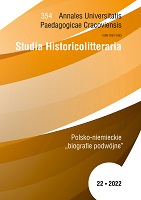„Utopkowa” tożsamość w niemieckojęzycznej powieści Leszka Libery
The „Utopek” identity in the German-language novel by Leszek Libera
Author(s): Agnieszka MiernikSubject(s): Cultural history, Social history, Polish Literature, Sociology of Culture, Theory of Literature, Sociology of Literature
Published by: Wydawnictwo Uniwersytetu Komisji Edukacji Narodowej w Krakowie
Keywords: Leszek Libera; the figure of “Utopling”; Polish-German biographies; Upper Silesia;
Summary/Abstract: This article reflects on the universal values of Leszek Libera’s novel Utopek, on what always remains “unspeakable” in Silesian issues, and on the internal life of the personal (author’s) and collective memory of Silesian generations. The author deals, in an original and profound way, with the problems that are still traumatic for many people in Upper Silesia. The complex Polish-German biographies of the inhabitants of the Silesian lands include the fate of the author and his family, contributing to the collective memory of a difficult past. Written in exile, the German-language work was highly praised by native critics, who stressed that the novel could rival the great classics. The emigrants outlook allowed for a distanced and multi-perspective view of history that cannot be discussed in rigid paradigms. The specificity, complexity and indeterminacy of Silesian identity are expressed in the novel through the figure of the Utopling, a fictional being who does not fit into the world in which he lives, who perceives the absurdities of reality and longs to return to his native utopia. The figure of the Utopling embraces the extremes and opposites inherent in the Silesian landscape. The character is at once hypersensitive and cruel, native and universal, local and a stranger, outgoing and claustrophobic, likeable and repulsive.
Journal: Annales Universitatis Paedagogicae Cracoviensis. Studia Historicolitteraria
- Issue Year: 2022
- Issue No: 22
- Page Range: 207-222
- Page Count: 16
- Language: Polish

